| Return to main page |
The next morning the whole group apart from Tom gathered at the minibus. 'It's only ten minutes from here to the border,' said the Professor. 'I've not mentioned this up to now because I didn't want to raise any false hopes, but now I've made some enquiries and I'm pleased to say that the border queue is not very long at the moment, and those of you who need visas should be able to obtain them without too much trouble. I think it should be worthwhile: state borders are very interesting places for anthropologists, not just because of the symbolism on display, but also for all the varieties of human interaction that unfold there. You'll see what I mean. Don't ask me what we'll do on the other side: we'll decide that when we get there! I hope you've all brought your journals along.'
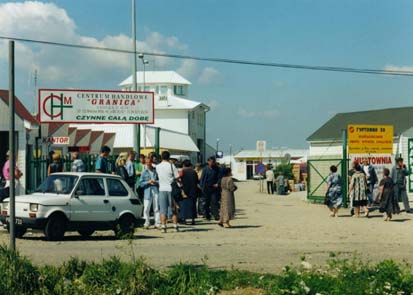
Figure 73: The border trading post
Ten minutes later they were in a queue of cars and buses only a few hundred yards from the hive of buildings that marked the border crossing. The students walked up to arrange the formalities, but it all turned out to be more complicated than the Professor had been led to expect. A visa for even the shortest of stays cost a large number of dollars, and this was emphatically not negotiable. The Professor was about to admit defeat when Ania spotted Jarek in the melée surrounding the counter marked 'customs payments'. He understood their problem at once and approached the passport official, who was obviously a pal of some sort. The passports were quickly collected and returned, complete with the necessary stamps. The Professor smiled quietly and asked Jarek how much he should pay. 'Don't worry about it. I said you would be my guests for the day. The only thing that matters is that you've got to cross back into Poland before midnight, while this man is still on duty.'
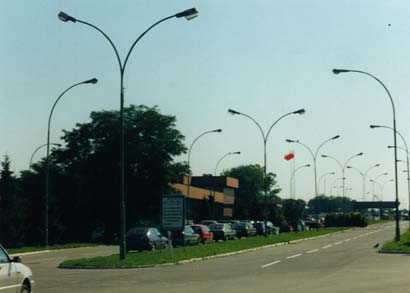
Figure 74: No man's land at the border
Another two steaming hours were spent in the queue before they finally entered Ukraine - time enough to confirm the Professor's observation about a wide range of emotions and address styles between travellers and officials. They stopped for lunch at the first small town they reached. Physically it was hardly any different from many of the small towns they had seen in Poland, but the Cyrillic letters and relative absence of advertising combined to make the commercial centre seem somehow very different. Since neither the Professor nor his wife could speak Ukrainian (though they claimed to be able to understand it well enough, especially if it was spoken slowly) they were pleased to invite Jarek to join them and order their meals. This was easy enough: red beetroot soup followed by cheese dumplings were the only dishes available.
They sped on behind Jarek's old Lada and didn't stop until, about an hour and a half later, they pulled up in the centre of Lviv. 'Welcome to the capital of the Western Ukraine,' said the Professor. 'This was once the capital of Galicia and the most important city in this part of the Austro-Hungarian Empire. In those days it was a predominantly Polish city. The peasants in the surrounding countryside were mainly Ukrainian, but the intellectuals were almost all Poles. My own grandfather was a university lecturer here in the inter-war decades. I remember as a child he used to tell me about the magic of these streets, and how, when he himself was a child, he had studied the poems of Adam Mickiewicz in school, and then the whole class was taken by their teacher to admire a larger than life statue of Poland's great national poet. Look, it's still there, although some Ukrainian nationalists from time to time suggest removing it, the way that all the statues of Lenin and Stalin have been taken away and destroyed. I think the authorities realised that, while they might conceivably have removed this statue, they could not possibly remove all the other traces of Polish history from this city. Poles may be only a tiny proportion of its population today, perhaps no larger than the proportion of Ukrainians in Przemysl. But all these recent immigrants, who include many Russians, must still realise that this wonderful urban landscape was the work of Poles.'
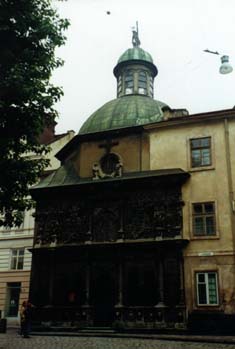
Figure 75: The Roman Catholic cathedral
'I know about this,' said Ania, 'my grandfather also came from here.' 'Most of the Polish population was deported in 1945 to the western parts of Poland' said the Professor. 'Remarkably enough, many of the best Polish university staff were relocated in the city of Wroclaw, which used to be the Prussian city of Breslau, and they managed to recreate some of their most successful departments at the new Polish university they established there.'
'And did they leave statues of past German heroes undisturbed?' asked Ania. The Professor was not sure and the comparison seemed to displease him. Ania whispered to another student: 'Remember what they did to that church recently in Przemysl. That city also has a multicultural history, yet the Polish nationalists are determined to efface it. Thank heavens the people here seem to be a bit more generous.' Dr. Dylagowa overheard this and said that, in her view, the criticism of Poles was not fair. 'There are plenty of extreme nationalists here in Western Ukraine, many of them very anti-Polish. Fortunately, in a big city like L'viv it is possible for more tolerant voices to prevail. You should compare this place with Cracow or Warsaw, where the Polish authorities do their best to respect multiethnic histories, and not just with a smaller city like Przemysl.'
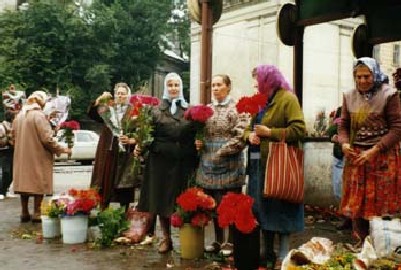
Figure 76: L'viv's culture of flowers
There was not much time to explore. Ania noticed some peasant women selling flowers, and she thought that both looked indistinguishable form their equivalents in Cracow. She would have liked to linger longer at the Greek Catholic cathedral church of Saint George, the opulent baroque style of which seemed so radically different from all the usual architectural forms of eastern Christianity. 'Of course, it is an example of how the Greek Catholics were subject to pressures from the west, what some anthropologists call acculturation,' said Dr. Dylagowa. 'Many members of this church have tried to fight these tendencies, to assert the purity of their authentic eastern forms of worship. This is the policy encouraged by the bishops and by the Pope himself, who does not want to be accused of weakening the eastern tradition. Others argue that it makes no sense to seek this original authenticity: they say that the Greek Catholics have evolved their own religious synthesis of east and west, and they should be able to continue this process of gradual change and accommodation, including the appropriation of whatever elements of western ecclesiastical culture that happen to attract them.' Before leaving this building they were treated to a choral concert, presumably the cathedral choir practising for the following day's services. The unaccompanied voices had an ethereal quality, utterly unlike the singing that Ania knew from the Polish churches she had attended in London.
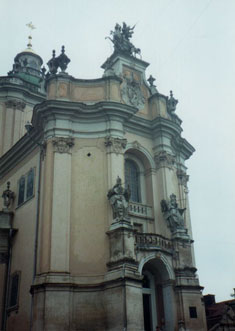
Figure 77: St. George's Cathedral (Greek Catholic)
After an expensive formal tea in the Grand Hotel, the party set off back towards the border. At about the half way point they left the main road and followed Jarek across sparsely populated districts of forest and meadow to his home village. His parents were obviously relieved to see him and if they were surprised to have such a large party of unexpected visitors, they betrayed no sign of it. There was just enough daylight left for them to walk up the main street of this village. Jarek's father pointed to some disintegrating farm buildings. 'That was the collective farm they built after the Red Army took over, on the foundations of the old manor house. It's still the basis of our farming in this village. The old communist officials are still running the cooperative in much the same way they used to. I could never stomach it, myself. I worked for years as a mechanic in the Crimea and I've got contacts all around the Black Sea. I'm determined to start a business and leave something more substantial for my sons to inherit than a share in a moribund farm. Right now I've got a good network going for leather goods. Next year I want to expand into furs. I'd like to open a shop in Przemysl. It would have to be in my cousin's name, for legal reasons, but of course we trust each other completely; and in this way I can get a foothold in the European market.' Ania found these aspirations quietly impressive.
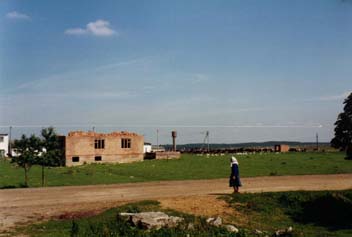
Figure 78: Scene in Jarek's village.
He also showed them the Greek Catholic church. Ania noticed that a few graves were elaborately adorned with flags and national insignia. 'They were freedom fighters who lost their lives at the end of the last war. For fifty years we could not honour them, but these days it is possible and our priest makes sure that the village children tend these graves regularly.' The cemetery contained two separate enclosures with numerous statues and commemorative plaques, whereas all the other graves were marked only by headstones or simple crosses. 'That's where the landlords were buried. They were Polish, though all the people who worked for them were Ukrainian. My father told me how they sabotaged his harvest in 1930, and how some students even set fire to the manor. That's how it was here until the communists took over. It's no wonder people are afraid to take the plunge and become independent farmers now; the people here have never had any tradition of independence.' Ania wondered how he himself had come to acquire a different world view. Yet Jarek's father made it clear that he identified strongly with his community. He had donated some of the profits from his trading operations to pay for a new iconostasis in the church. 'Come and visit us again in two week's time for our patronal feast! The service takes about three hours, but then we recover by eating and drinking non-stop for at least six! And the singing is as beautiful as anything you can hear in the cathedral in Lviv.'
Jarek's mother had prepared a modest feast and vodka was produced, not in
regular bottles but in several five litre containers. The Professor reminded
Jarek that they had to be back at the border before midnight. 'My parents will
be deeply hurt if you do not accept our hospitality,' smiled Jarek. 'You have
plenty of time. First, I want to ask one favour of all of you. Please come to
our store in the barn and try on some of our jackets. Each individual is allowed
to wear one and carry a second across the border. Just leave them for me to
collect at the youth hostel when I return to Przemysl next week. That will be
a major saving for us, and it won't cost you anything at all.'
| Return to main page |